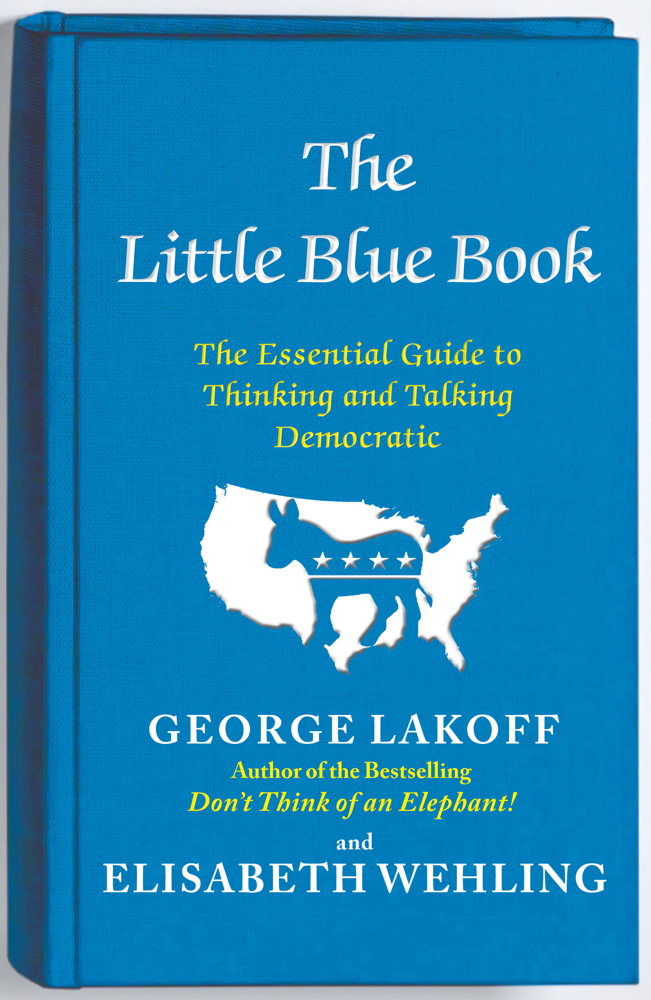Last week I boiled down George Lakoff’s latest book into a handful of bullet points—a sort of Lakoff Messaging 101. At the heart of The Little Blue Book there is also an extensive examination of how we talk about our government in moral terms. And it deserves a second Lakoff crib sheet!
Lakoff and his co-author, Elisabeth Wehling, insist that we “must openly and regularly talk about the function of the public. The public is, and has always been, requisite for our freedom, our success, and our humanity as a nation.” I agree: we need to find better ways to talk about government—how together, through our democratic government, we build the foundation for a thriving private sector with successful businesses and individual prosperity and freedom.
Of course, it’s sort of the trendy thing to dis George. And I do find a lot to criticize about the new book—the biggest disappointment is that the talking points after each chapter often fail to follow Lakoff’s own cardinal messaging rules, like starting with your moral values and using simple language.
Lakoff’s riffs on “predatory privatization” and “corporate government,” while fascinating and important, sometimes strike out (polling I’ve seen indicates that people aren’t likely to get cozy with terms like “corporate tyranny”). But when Lakoff does connect in these chapters, it’s a home run. The book offers powerful language articulating government’s important jobs that we all rely on “all day, everyday,” including how government is our best tool to protect ourselves from too much corporate power.
It’s screaming to be laid out all in one place. So, here’s my interpretation of Lakoff on the role government (in 100 words or less):
[flashcard]
Government: Our Best Tool
Talk VALUES. Government’s moral duty is to protect and empower every American. It’s our tool for safeguarding and expanding American opportunity and freedom.
Link PUBLIC AND PRIVATE. It’s through government that we build and maintain the foundations necessary for individual freedom and thriving businesses.
Talk CORPORATE POWER. Corporations can do good, but they shouldn’t run the show. A robust government is a tool to protect us from too much corporate power.
Say it WITH PRIDE! That’s government’s job! That’s how we built this country. That’s who we are. That’s what makes us great.
[/flashcard]
Now, you might be thinking, “This seems risky.” Or, “Easier said than done.” “Government is tricky for us to talk about for a reason.” You’re right.
Are we crystal clear on our feelings about government? Probably not. In fact, if you’re like most Americans you probably have mixed opinions—especially when the system doesn’t seem to be working. Indeed, Lakoff would probably tell us that any language problem in talking about government is really an idea problem.
Hopefully working through these language questions—with Lakoff’s assistance—can help clarify our thinking on the big ideas and sharpen our core convictions about government’s role as well. Then, it’s only through practice and repetition that we get good at talking about it!
And of course, there’s nothing like a presidential election to sharpen the nation’s focus on how we define our country, our values, and ourselves (heard any high-profile candidates talking about the role of government lately?) So, what better time for policy wonks to hone our own messages on government—a topic that can trip up the best communicators no matter what policy solution we’re talking about?
I’m by no means finished! Look for upcoming Flashcards where I will distill useful language from other experts and thinkers grappling with the government question. And, as always, send your feedback and ideas my way.
And once again, for the record, Sightline’s work is not directed at Democrats in particular as Lakoff and Wehling’s book clearly is. There are some general messaging lessons and useful language from The Little Blue Book that I think are worth sharing with our audiences working toward sustainability policy solutions.


Comments are closed.